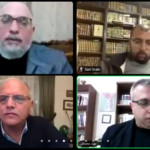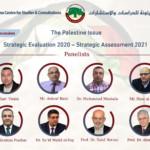Al-Zaytouna Centre for Studies and Consultations held on 12/1/2021 the first session of the panel discussion, “The Palestine Issue: Strategic Evaluation 2020 – Strategic Assessment 2021.”
Participants included a group of researchers, scholars, specialists and those interested in the Palestine issue, who discussed the internal Palestinian scene, the internal Israeli scene, the peace process and the Arab landscape affecting the Palestine issue.
The panel discussion was moderated by Prof. Dr. Mohsen Mohammad Saleh, and the main panelists included Sari ‘Orabi, Hani al-Masri, Dr. Muhannad Mustafa, and Ashraf Bader.
Sari ‘Orabi discussed the developments of the Palestinian Reconciliation in 2020 and its possible prospects for 2021. He said that Hamas had agreed to a non-synchronized elections not because of Biden’s win in the US presidential election, rather because of its endeavor to overcome the obstacles to national unity. However, ‘Orabi said that considering elections as the only way to end the division is not new, and that even if the elections were held, this would not mean the end of schism. For there is a disagreement between Fatah and Hamas over their view of the Palestinian political system, where Hamas does not recognize the bases on which the PA was established, which is primarily having a security role. The essence of the dispute is the disagreement between two programs; a program based on achieving Palestinian rights through a peaceful settlement with the occupation, which has failed over the past years, and a program based on resisting the occupation by all means, especially through armed resistance. ‘Orabi saw that ‘Abbas is concerned with legislative elections to renew the PA’s legitimacy and the peace process, whereas he is not interested in the elections of the Palestinian National Council (PNC) and the rebuilding of the Palestine Liberation Organization (PLO). He said that he’s afraid that if the elections were held, they will either lead to the recycling of the Palestinian division or drag Hamas into the political realm of Fatah. ‘Orabi concluded that the reconciliation and the elections remain governed by many considerations, whether by the power centers in the Fatah movement or the stances of international, Israeli and Arab parties.
The second panelist was Hani al-Masri, who discussed the peace process and the Israeli annexation plans in 2020. He believed that although the “Deal of the Century” reflects the Zionist approach to the conflict, the Israeli right rejects any deal that sets borders for any Palestinian state. He expected that during Biden’s term the core of the deal would remain, for Biden supports Zionism, hence, he will not exert pressure on the Israeli side during his term; particularly since there are much more important priorities for the US president than the Palestine issue. Therefore, al-Masri warned, the Palestinian side must pay attention to this point and rely on itself in its national struggle. Al-Masri was astonished by the series of concessions that the PA leadership began to make in the wake of Biden’s victory, especially concerning the prisoners and the security coordination, for he considered these concessions would not restore the relationship with US to its previous state, nor will they open the doors of US aid without requests in return. Al-Masri believed that the way Hamas has recently managed the conflict with Israel and its adaptation to international and regional changes would not stop targeting it, and the same applies to Fatah and the PA. He considered the solution lies in putting the Palestinian house in order on the basis of Palestinian interests, and in ending the division on national bases, and that the PA must change by adopting a national work plan rather than being itself dissolved. At the end, al-Masri asserted that the main stake must be on the people, the steadfastness, and the resistance, and that there are no free elections under the occupation.
The third panelist was Dr. Muhannad Mustafa, who discussed the developments of the Israeli internal scene in 2020 and its possible prospects for 2021. He saw that the Israeli political system in 2020, has become captive to the right-wing bloc, which consists of the conservative right and the religious nationalist right wings. The former is represented in the Blue and White party, while the latter in the dominant right-wing bloc headed by the Likud Party. In the next elections, there will be competition within the religious nationalist movement. Mustafa pointed out that, during the past two years, Israel, governance wise, has become one of the most unstable political systems, as there are elections and a change of government every two years and three months. The right-wing bloc controlling the government is in fragments, there are intra-party fissures and inter-party mobility of political leaders, in addition, some parties are dissolved while others are established, especially within the right-wing nationalist movement. Despite all that, the Likud is still the dominant party in Israeli politics, where opinion polls indicate the possibility of it winning 28 seats in the upcoming elections. Muhannad believes that the current Oslo Accords have strengthened the Israeli right, and at the end he asked about the way to make this reality contradict the Zionist project.
The fourth panelist was Ashraf Bader who discussed the developments of the Arab countries surrounding Israel and the Palestine issue, and the possible prospects for 2021. He considered that the crises of the Arab countries have reflected negatively on the Palestine issue, and that the Arab reaction to the “Deal of the Century” did not fulfill the aspirations regarding the Palestine issue. He emphasized that the recent Arab normalization with Israel had a negative impact and have increased the pressure on the Palestinian side. Furthermore, Israel has benefited from the decline of Arab and Islamic support, the division of the Arab countries and the conflicts and wars in some of them, to increase the marginalization of the Palestine issue.
There were many rich and important interventions including those of Basil Khalaf, Amin Hoteit, ‘Abdul Hamid bin Salem, Jawad al-Hamad, Ziad Ibheis, Maryam Abu Daqqa, Wa’el Najm, Ayman Zaidan, ‘Adnan Abu Amer, Zuhair Hawari, Ahmad Nabulsi and Husam Shweiki.
At the end, Saleh thanked the participants for their contribution, stressing that the topic and ideas discussed in the panel were vital and useful, hoping that these ideas will contribute to serving the Palestine issue and everybody working for it.
He added that we are crossing a historical milestone, as the region is being reconfigured. Therefore we need to be very aware and responsible. We need to rebuild a true Palestinian national project in order to face the upcoming challenges.





Leave A Comment